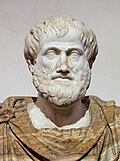Aristotle's biology is the theory of biology, grounded in systematic observation and collection of data, mainly zoological, embodied in Aristotle's books...
61 KB (6,514 words) - 02:19, 4 November 2024
and Aristotle. Prometheus Books. Reeve, C. D. C. (2000). Substantial Knowledge: Aristotle's Metaphysics. Hackett. Rose, Lynn E. (1968). Aristotle's Syllogistic...
163 KB (17,767 words) - 19:20, 31 October 2024
2017). "Aristotle's Biology". Plato. Stanford University. Archived from the original on 7 May 2019. Retrieved 23 March 2019. Section 2: Aristotle's Philosophy...
21 KB (2,089 words) - 19:15, 9 October 2024
Aristotle's views on women influenced later Western thinkers, who quoted him as an authority until the end of the Middle Ages. Aristotle gave equal weight...
13 KB (1,663 words) - 00:42, 2 March 2024
research". While the concept of form in biology, opposed to function, dates back to Aristotle (see Aristotle's biology), the field of morphology was developed...
9 KB (946 words) - 16:27, 28 August 2024
Plant (redirect from Plant (biology))
multicellular, except for some green algae. Historically, as in Aristotle's biology, the plant kingdom encompassed all living things that were not animals...
95 KB (8,058 words) - 16:48, 4 November 2024
Aristotelian physics (category Philosophy of Aristotle)
similar to Aristotle's elements; the term "air", for instance, does not refer to breathable air. Lang, H.S. (2007). The Order of Nature in Aristotle's Physics:...
49 KB (6,445 words) - 09:01, 2 October 2024
On Generation and Corruption (category Works by Aristotle)
and Passing Away is a treatise by Aristotle. Like many of his texts, it is both scientific, part of Aristotle's biology, and philosophic. The philosophy...
11 KB (1,591 words) - 18:45, 25 October 2024
October 2008. Retrieved 8 October 2008. Lennox, J.G. 2001. Aristotle's Philosophy of Biology: Studies in the Origins of Life Science. Cambridge: Cambridge...
83 KB (10,110 words) - 12:50, 11 October 2024
Four causes (redirect from Aristotle's Four Causes)
"causes" might merge, Aristotle held that his four "causes" provided an analytical scheme of general applicability. Aristotle's word aitia (Greek: αἰτία)...
38 KB (4,884 words) - 02:20, 29 October 2024







